2013 Toyota Prius Tires, Repair & Service
Get Started
Complete Auto Care for Your 2013 Toyota Prius
-
TIRES FOR YOUR 2013 Toyota Prius View Tire Info GET TIRE PRICING
-
REPAIR FOR YOUR 2013 Toyota Prius View Repair Info SCHEDULE REPAIR
-
MAINTENANCE FOR YOUR 2013 Toyota Prius View Maintenance Info SCHEDULE MAINTENANCE
-
OFFERS FOR YOUR 2013 Toyota Prius Limited Time Tire Offers VIEW ALL COUPONS
2013 Toyota Prius Tires
Recommended Tires | Tire Information
2013 Toyota Prius Tires Sizes, Speed Ratings, and Inflation
Not sure about your 2013 Toyota Prius tire size? Use the following chart to find information on tire size, speed rating, and inflation.
| Trim Level | Speed Rating | Inflation in PSI F/R | Tire Size |
|---|---|---|---|
| 2013 Toyota Prius Two* | S | 35 PSI/33 PSI | P195/65R15 |
| 2013 Toyota Prius Two* | S | 35 PSI/33 PSI | P195/65R15 |
| 2013 Toyota Prius Two* | S | 35 PSI/33 PSI | P195/65R15 |
| 2013 Toyota Prius Two* | S | 35 PSI/33 PSI | P195/65R15 |
| 2013 Toyota Prius Two* | S | 35 PSI/33 PSI | P195/65R15 |
| 2013 Toyota Prius Two* | S | 35 PSI/33 PSI | P195/65R15 |
| 2013 Toyota Prius Two* | S | 35 PSI/33 PSI | P195/65R15 |
| 2013 Toyota Prius Two* | S | 35 PSI/33 PSI | P195/65R15 |
| 2013 Toyota Prius Two* | S | 35 PSI/33 PSI | P195/65R15 |
| 2013 Toyota Prius Two* | S | 35 PSI/33 PSI | P195/65R15 |
| 2013 Toyota Prius Two* | S | 35 PSI/33 PSI | P195/65R15 |
| 2013 Toyota Prius Two* | S | 35 PSI/33 PSI | P195/65R15 |
| 2013 Toyota Prius Four* | S | 35 PSI/33 PSI | P195/65R15 |
| 2013 Toyota Prius Four* | S | 35 PSI/33 PSI | P195/65R15 |
| 2013 Toyota Prius Four* | S | 35 PSI/33 PSI | P195/65R15 |
| 2013 Toyota Prius Four* | S | 35 PSI/33 PSI | P195/65R15 |
| 2013 Toyota Prius Four* | S | 35 PSI/33 PSI | P195/65R15 |
| 2013 Toyota Prius Four* | S | 35 PSI/33 PSI | P195/65R15 |
| 2013 Toyota Prius Four* | S | 35 PSI/33 PSI | P195/65R15 |
| 2013 Toyota Prius Four* | S | 35 PSI/33 PSI | P195/65R15 |
| 2013 Toyota Prius Four* | S | 35 PSI/33 PSI | P195/65R15 |
| 2013 Toyota Prius Four* | S | 35 PSI/33 PSI | P195/65R15 |
| 2013 Toyota Prius Four* | S | 35 PSI/33 PSI | P195/65R15 |
| 2013 Toyota Prius Four* | S | 35 PSI/33 PSI | P195/65R15 |
| 2013 Toyota Prius Three* | S | 35 PSI/33 PSI | P195/65R15 |
| 2013 Toyota Prius Three* | S | 35 PSI/33 PSI | P195/65R15 |
| 2013 Toyota Prius Three* | S | 35 PSI/33 PSI | P195/65R15 |
| 2013 Toyota Prius Three* | S | 35 PSI/33 PSI | P195/65R15 |
| 2013 Toyota Prius Three* | S | 35 PSI/33 PSI | P195/65R15 |
| 2013 Toyota Prius Three* | S | 35 PSI/33 PSI | P195/65R15 |
| 2013 Toyota Prius Three* | S | 35 PSI/33 PSI | P195/65R15 |
| 2013 Toyota Prius Three* | S | 35 PSI/33 PSI | P195/65R15 |
| 2013 Toyota Prius Three* | S | 35 PSI/33 PSI | P195/65R15 |
| 2013 Toyota Prius Three* | S | 35 PSI/33 PSI | P195/65R15 |
| 2013 Toyota Prius Three* | S | 35 PSI/33 PSI | P195/65R15 |
| 2013 Toyota Prius Three* | S | 35 PSI/33 PSI | P195/65R15 |
| 2013 Toyota Prius Five* | V | 33 PSI/32 PSI | P215/45R17 |
| 2013 Toyota Prius Five* | V | 33 PSI/32 PSI | P215/45R17 |
| 2013 Toyota Prius Five* | V | 33 PSI/32 PSI | P215/45R17 |
| 2013 Toyota Prius Five* | V | 33 PSI/32 PSI | P215/45R17 |
| 2013 Toyota Prius Five* | V | 33 PSI/32 PSI | P215/45R17 |
| 2013 Toyota Prius Five* | V | 33 PSI/32 PSI | P215/45R17 |
| 2013 Toyota Prius Five* | V | 33 PSI/32 PSI | P215/45R17 |
| 2013 Toyota Prius Five* | V | 33 PSI/32 PSI | P215/45R17 |
| 2013 Toyota Prius Five* | V | 33 PSI/32 PSI | P215/45R17 |
| 2013 Toyota Prius Five* | V | 33 PSI/32 PSI | P215/45R17 |
| 2013 Toyota Prius Five* | V | 33 PSI/32 PSI | P215/45R17 |
| 2013 Toyota Prius Five* | V | 33 PSI/32 PSI | P215/45R17 |
|
2013 Toyota Prius Two* Speed Rating: S Inflation F/R: 35 PSI/33 PSI |
|
2013 Toyota Prius Two* Speed Rating: S Inflation F/R: 35 PSI/33 PSI |
|
2013 Toyota Prius Two* Speed Rating: S Inflation F/R: 35 PSI/33 PSI |
|
2013 Toyota Prius Two* Speed Rating: S Inflation F/R: 35 PSI/33 PSI |
|
2013 Toyota Prius Two* Speed Rating: S Inflation F/R: 35 PSI/33 PSI |
|
2013 Toyota Prius Two* Speed Rating: S Inflation F/R: 35 PSI/33 PSI |
|
2013 Toyota Prius Two* Speed Rating: S Inflation F/R: 35 PSI/33 PSI |
|
2013 Toyota Prius Two* Speed Rating: S Inflation F/R: 35 PSI/33 PSI |
|
2013 Toyota Prius Two* Speed Rating: S Inflation F/R: 35 PSI/33 PSI |
|
2013 Toyota Prius Two* Speed Rating: S Inflation F/R: 35 PSI/33 PSI |
|
2013 Toyota Prius Two* Speed Rating: S Inflation F/R: 35 PSI/33 PSI |
|
2013 Toyota Prius Two* Speed Rating: S Inflation F/R: 35 PSI/33 PSI |
|
2013 Toyota Prius Four* Speed Rating: S Inflation F/R: 35 PSI/33 PSI |
|
2013 Toyota Prius Four* Speed Rating: S Inflation F/R: 35 PSI/33 PSI |
|
2013 Toyota Prius Four* Speed Rating: S Inflation F/R: 35 PSI/33 PSI |
|
2013 Toyota Prius Four* Speed Rating: S Inflation F/R: 35 PSI/33 PSI |
|
2013 Toyota Prius Four* Speed Rating: S Inflation F/R: 35 PSI/33 PSI |
|
2013 Toyota Prius Four* Speed Rating: S Inflation F/R: 35 PSI/33 PSI |
|
2013 Toyota Prius Four* Speed Rating: S Inflation F/R: 35 PSI/33 PSI |
|
2013 Toyota Prius Four* Speed Rating: S Inflation F/R: 35 PSI/33 PSI |
|
2013 Toyota Prius Four* Speed Rating: S Inflation F/R: 35 PSI/33 PSI |
|
2013 Toyota Prius Four* Speed Rating: S Inflation F/R: 35 PSI/33 PSI |
|
2013 Toyota Prius Four* Speed Rating: S Inflation F/R: 35 PSI/33 PSI |
|
2013 Toyota Prius Four* Speed Rating: S Inflation F/R: 35 PSI/33 PSI |
|
2013 Toyota Prius Three* Speed Rating: S Inflation F/R: 35 PSI/33 PSI |
|
2013 Toyota Prius Three* Speed Rating: S Inflation F/R: 35 PSI/33 PSI |
|
2013 Toyota Prius Three* Speed Rating: S Inflation F/R: 35 PSI/33 PSI |
|
2013 Toyota Prius Three* Speed Rating: S Inflation F/R: 35 PSI/33 PSI |
|
2013 Toyota Prius Three* Speed Rating: S Inflation F/R: 35 PSI/33 PSI |
|
2013 Toyota Prius Three* Speed Rating: S Inflation F/R: 35 PSI/33 PSI |
|
2013 Toyota Prius Three* Speed Rating: S Inflation F/R: 35 PSI/33 PSI |
|
2013 Toyota Prius Three* Speed Rating: S Inflation F/R: 35 PSI/33 PSI |
|
2013 Toyota Prius Three* Speed Rating: S Inflation F/R: 35 PSI/33 PSI |
|
2013 Toyota Prius Three* Speed Rating: S Inflation F/R: 35 PSI/33 PSI |
|
2013 Toyota Prius Three* Speed Rating: S Inflation F/R: 35 PSI/33 PSI |
|
2013 Toyota Prius Three* Speed Rating: S Inflation F/R: 35 PSI/33 PSI |
|
2013 Toyota Prius Five* Speed Rating: V Inflation F/R: 33 PSI/32 PSI |
|
2013 Toyota Prius Five* Speed Rating: V Inflation F/R: 33 PSI/32 PSI |
|
2013 Toyota Prius Five* Speed Rating: V Inflation F/R: 33 PSI/32 PSI |
|
2013 Toyota Prius Five* Speed Rating: V Inflation F/R: 33 PSI/32 PSI |
|
2013 Toyota Prius Five* Speed Rating: V Inflation F/R: 33 PSI/32 PSI |
|
2013 Toyota Prius Five* Speed Rating: V Inflation F/R: 33 PSI/32 PSI |
|
2013 Toyota Prius Five* Speed Rating: V Inflation F/R: 33 PSI/32 PSI |
|
2013 Toyota Prius Five* Speed Rating: V Inflation F/R: 33 PSI/32 PSI |
|
2013 Toyota Prius Five* Speed Rating: V Inflation F/R: 33 PSI/32 PSI |
|
2013 Toyota Prius Five* Speed Rating: V Inflation F/R: 33 PSI/32 PSI |
|
2013 Toyota Prius Five* Speed Rating: V Inflation F/R: 33 PSI/32 PSI |
|
2013 Toyota Prius Five* Speed Rating: V Inflation F/R: 33 PSI/32 PSI |
* Note: these models have different tire sizes depending on vehicle options.
Recommended Tires for Your 2013 Toyota Prius
What tires are best for a 2013 Toyota Prius? Check out the following tire brands and types.
 Blizzak WS90
Blizzak WS90
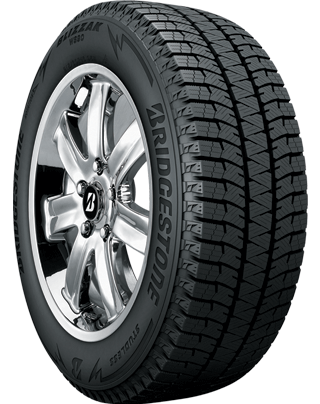
- No warranty
- Winter
- Winter
 Ecopia EP422 Plus
Ecopia EP422 Plus
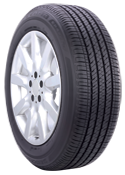
- Platinum Pact Limited Warranty
- All-Season
- Performance
 DriveGuard Plus
DriveGuard Plus
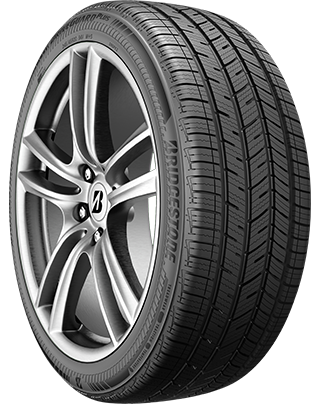
- Platinum Pact Limited Warranty
- All-Season
- Performance
 Potenza RE71RS
Potenza RE71RS
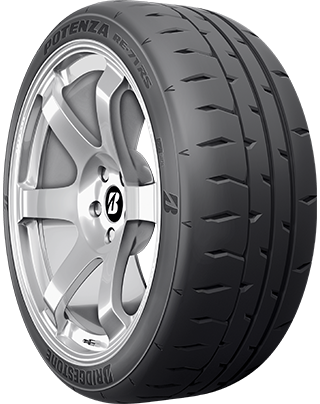
- No warranty
- Summer
- Performance
 Potenza Sport
Potenza Sport
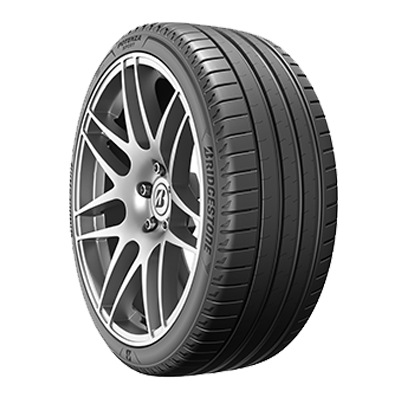
- Platinum Pact Limited Warranty
- Summer
- Performance
 Turanza QUIETTRACK
Turanza QUIETTRACK
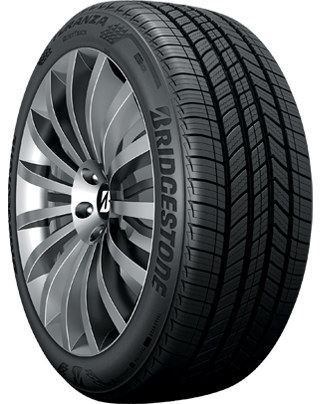
- No warranty
- All-Season
- Performance
 Potenza Sport AS
Potenza Sport AS
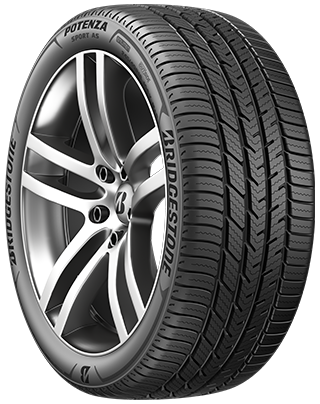
- Platinum Pact Limited Warranty
- All-Season
- Performance
 WEATHERPEAK
WEATHERPEAK
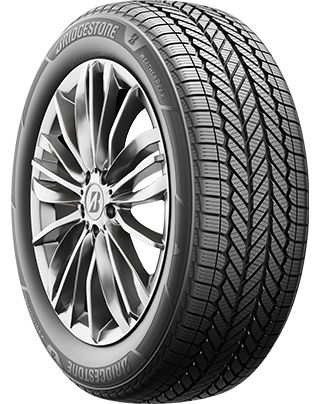
- Platinum Pact Limited Warranty
- All-Season
- Passenger Tires
 Affinity Touring S4 FF
Affinity Touring S4 FF
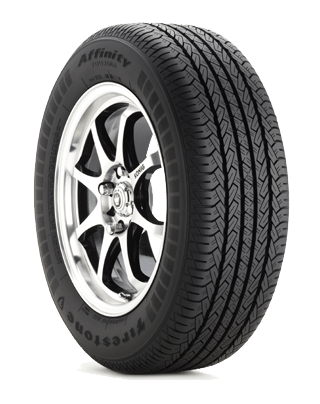
- Gold Pledge Limited Warranty
- All-Season
- Passenger Tires
 ALL SEASON
ALL SEASON

- No warranty
- All-Season
- Passenger Tires
 WEATHERGRIP
WEATHERGRIP
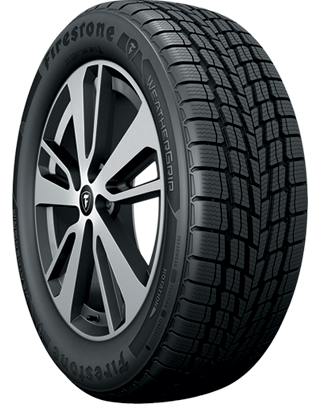
- No warranty
- All-Season
- Passenger Tires
 Firehawk Indy 500
Firehawk Indy 500
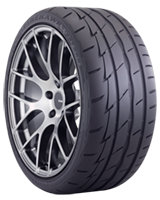
- Gold Pledge Limited Warranty
- Summer
- Performance
 FT140
FT140
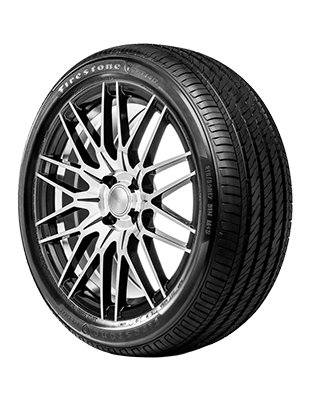
- No warranty
- All-Season
- Passenger Tires
 Firehawk AS V2
Firehawk AS V2
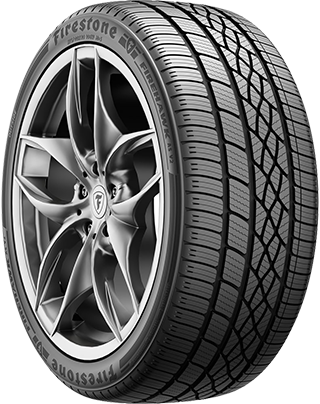
- No warranty
- All-Season
- Performance
 Winterforce 2
Winterforce 2
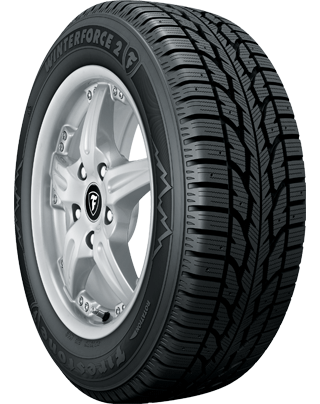
- No warranty
- Winter
- Winter

- No warranty
- All-Season
- Performance

- No warranty
- All-Season
- Passenger Tires

- No warranty
- All-Season
- Passenger Tires
 PROXES R1R
PROXES R1R
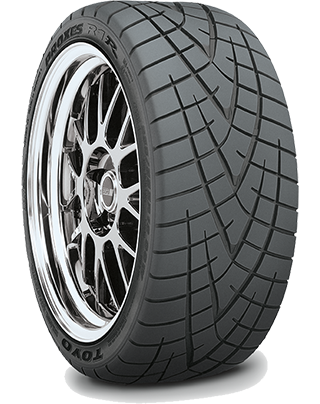
- No warranty
- Summer
- Performance
 PROXES Sport
PROXES Sport
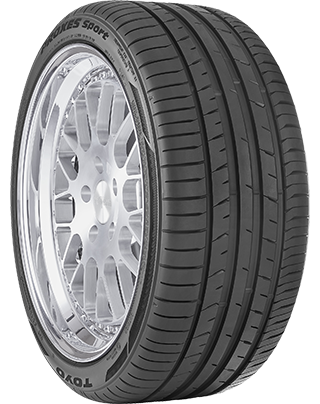
- No warranty
- Summer
- Performance
 PROXES Sport A/S
PROXES Sport A/S
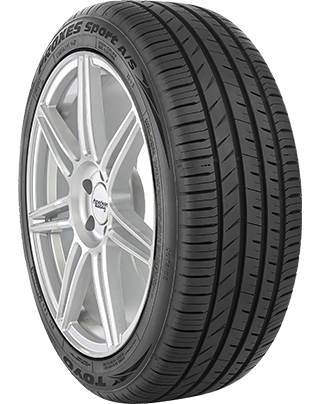
- No warranty
- All-Season
- Performance
 Extensa A/S II
Extensa A/S II

- No warranty
- All-Season
- Passenger Tires
Choosing 2013 Toyota Prius Tires
Apart from finding the right tire size, there are a couple of other factors to consider when buying Toyota Prius tires like where and how you drive, and what tire brand you trust most. When evaluating your driving conditions, think about where you live (countryside vs. city vs. mountains) and the kind of unexpected weather you're likely to experience. Many drivers who live in states that experience all four seasons choose to purchase two sets of tires: one set for winter, one set for summer. Other drivers prefer the convenience of all-season tires. They make one trip to the tire shop and they're pretty much ready for rain, light snow, or sun!
Your personal driving style is the next factor to consider. If you're an avid off-roader who yearns to pioneer new paths, you have very different tire needs than a highway commuter who doesn't hit the hills very often. Browse Toyota Prius tires online or come to your nearby Firestone Complete Auto Care for help selecting the tire that's right for you.
Toyota Prius Installation and More
Firestone Complete Auto Care has been a leading tire provider for more than a century. We're a tire store that also offers professional tire installation, maintenance, and rotation, along with complete auto care. We make it easy to buy new 2013 Toyota Prius tires online and book an installation appointment at the same time.
2013 Toyota Prius Tire Questions
-
Why check Toyota tire inflation? The right tire pressure can make all the difference. Proper tire inflation helps increase fuel economy, improve braking time, and boost tire lifespan! Even a small change in tire pressure can impact your driving.
-
What do the numbers on my Toyota Prius tires mean? Your tire sidewall gives you information about load carrying capacity, speed rating, treadwear, traction, and tire size. Talk to one of our tire technicians to learn how to read the numbers on your tire!
-
Is there an easy way to check Toyota tire tread depth? Stay on top of your tire tread depth to help avoid a dangerous drive. You can check tread depth with a penny. Hold the penny so that Abraham Lincoln is facing you, then place your penny into a tread groove upside down. If you can see the top of Abe’s head, your tread is shallow and it might be time for new Toyota Prius tires. Grab a penny. Hold the so that Abe Lincon's head is facing you and his hair is pointing toward the ground. Then, place the penny into a tread groove. If you can see the top of Abe’s head, your tread is shallow and it might be time for new Toyota Prius tires.
2013 Toyota Prius Repair
Want more details? Choose a service below to read more about Toyota Prius repairs at Firestone Complete Auto Care.
Get Repairs for Your 2013 Toyota Prius
Car repairs: for many drivers, that phrase is a dreadful one. We’re here to change that, though. At Firestone Complete Auto Care, we want to make car repair painless and hassle-free. When it’s time for 2013 Toyota Prius repair services, head to your nearest Firestone location and our technicians will take care of your Prius like it was their own. We’ll start by assessing what repairs may be needed, and we’ll provide you with a detailed explanation of what we recommend. If a repair isn't necessary, we won't recommend it.
What Will Toyota Prius Repairs Cost?
The cost to repair your 2013 Toyota Prius depends on the type of repair, the cost of any replacement parts, how much labor the repair will take, and your locale. We update them regularly to keep our deals fresh!
A few different aspects can influence repair costs for your 2013 Toyota Prius, like
Questions About 2013 Toyota Prius Auto Repairs
-
Do I still need scheduled maintenance even when nothing is wrong with my Toyota? One of the best ways to prevent 2013 Toyota Prius repairs is by staying on top of your Toyota maintenance schedule. This schedule is written by the people who made your vehicle and they know best how to keep it running smoothly.
-
What does it mean to be 'in tune' with your car? You’re in your car, day in and day out. So, it’s only expected that you know your car better than anyone else! If you notice mysterious smells, strange engine noises, or other out-of-the-ordinary symptoms while driving, trust your instincts and stop into Firestone Complete Auto Care for a Courtesy Check. Catching a potential issue early could help prevent Toyota Prius repairs.
-
Do I have to get the repairs you recommend for my Toyota? Talk to your technician. We'll never recommend a service or repair for your 2013 Toyota Prius that we don't think is necessary for your safety.
Get Your 2013 Toyota Prius Brakes Fixed
Your Toyota Prius may be powered by a strong engine. But if you can’t stop it, it’s as good as scrap metal. Don't wait if you're experiencing brake squeaks or a loss of braking power. Safe driving and responsive brakes go hand in hand. Plus, ignoring your brake problems can result in more damage and higher brake repair bills. Go to your local Firestone Complete Auto Care for 2013 Toyota Prius brake repairs. Our brake repair services include brake pad/shoe replacement, brake rotor/drum refinishing, brake fluid exchange, and wheel cylinder and brake caliper installation.
Answers to Your Prius Brakes Questions
-
What is causing my Prius to shake when I brake? Your Prius could shake when you brake due to worn brake pads or rotors, warped rotors, loose or worn suspension components, or faulty brake calipers. You can always schedule a free brake inspection at the first sign of strange brake behavior.
-
What is the average lifespan of Prius brake pads? You can usually get around 30,000 to 40,000 miles out of your brake pads, but how and where you drive your Prius can affect this. Hauling large loads or riding your brakes can shorten their lifespan, while smoothly braking and mostly sticking to highways can help your brake pads last longer.
-
Is it bad if my Prius is leaking brake fluid when off? Your Prius brake system is a closed hydraulic system, so a brake fluid leak likely means you have an issue in your brake system. Over time, brake components can wear out or get damaged, causing a brake fluid leak.
When to Get Toyota Prius Drivetrain Repairs
Drivetrains for front, rear, and all-wheel-drive and 4WD vehicles are not all the same. You don't want to go to any random shop for drivetrain repair. You want to go to Firestone Complete Auto Care. We can help repair all of your 2013 Toyota Prius drivetrain components Your Toyota could be crying out for driveshaft repair if you notice clunks when shifting, vibration as your vehicle accelerates, resistance when turning, or heavy vibrations in your floorboards.
2013 Toyota Prius Drivetrain Questions
-
What are the symptoms of a damaged Toyota drivetrain system? Noises toward the back of your Toyota Prius, leaking fluid, trouble turning — these could all be signs of drivetrain damage you want to address. Take action before something more severe happens.
-
What causes a Prius’s malfunction indicator light (MIL) to illuminate? The malfunction indicator light — also known as the check engine light — on your Prius can illuminate for a variety of reasons, including engine issues, electrical problems, damaged sensors, transmission problems, misfires, and faulty connections.
-
How concerning is a drivetrain malfunction in my Prius? If you experience a drivetrain malfunction in your Prius, it is important to have it inspected by a professional mechanic as soon as possible to identify the underlying cause and perform the necessary repairs. Driving with a malfunctioning drivetrain can be dangerous and cause further damage to your car.
2013 Toyota Prius Alignment Services
Alignment services involve precise adjustments to your Toyota Prius’s suspension system, which connects the wheels with the rest of the vehicle. During the service, calculated changes are made to the angles of your tires. This is so that your tires hit the road at an optimal angle for your vehicle’s performance — just as Toyota intended. Bring your 2013 Toyota Prius in for a wheel alignment and we'll start with an alignment check. After that, we can adjust your wheel alignment angles until they match Toyota’s recommended measurements.
Answers to Toyota Prius Alignment Questions
-
How can I avoid knocking my Toyota Prius out of alignment? When it’s safe to do so, avoid driving over potholes or hitting curbs. These road obstacles can wreak havoc on your wheel alignment, as can wear and tear from rough road conditions.
-
How frequently should you get a wheel alignment for your Prius? Typically, your alignment should be checked every 6,000 miles or 6 months, whichever comes first. Double-check your Prius owner’s manual for Toyota's exact recommended schedule.
-
Do you need to get your Prius wheels aligned? You likely aren't required to get an alignment when you put new tires on your Prius, but it's a super smart idea! An alignment can help ensure optimal tire wear, fuel efficiency, and handling. Still, you should reference your Prius owner’s manual for what’s recommended.
Engine Repairs for Your 2013 Toyota Prius
If your 2013 Toyota Prius needs engine repair, our expert techs will let you know what needs to be done and why before they get started. We never do any work without your sign-off. If a repair isn’t urgent right now, we’ll let you know. If it's necessary for your safety, we'll make sure you understand that, too. We want to give you all the details you need to make an informed decision about your engine repairs. By choosing Firestone Complete Auto Care for Prius engine repairs and you can feel confident knowing that we use Toyota-approved parts and components like the timing chain or belt, valve guide seal, fuses, or other parts.
Questions About 2013 Toyota Prius Engines
-
Why does the check engine light in my Prius turn on when I start my car? It’s usually normal for your check engine light to turn on upon ignition. This is just your Prius testing its circuits. The dash light shouldn't stay on. If it does, you might want to bring your vehicle in for service.
-
Why is my Toyota Prius making engine noise? Strange engine sounds can be a sign something’s off in your Toyota Prius. Knocking or tapping could be a symptom of low oil. A high-pitched whistle could signal an intake leak or misaligned belt. Squealing can be traced back to a loose fan belt, and grinding might be a sign of brake problems rather than engine issues.
-
Are you unknowingly damaging your Toyota Prius engine? Certain driving habits can hurt your engine. These habits include driving on an empty fuel tank, revving your engine while the vehicle is in Park, or slamming the gas pedal while the engine is still cold. Steer clear of these habits to help protect engine performance and efficiency.
2013 Toyota Prius Tire Repair
If your 2013 Toyota Prius is in need of a tire inspection or possible flat tire repair, Firestone Complete Auto Care has your back. In some cases, a tire doesn’t have to be replaced – it can be plugged and patched with a simple repair. Depending on the damage, though, a repair might not be the right move. Our technicians can determine which option is best for your situation. We'll start by evaluating the state of wear, the location of damage, type of damage, and the size of the damage.
If we determine that your 2013 Toyota Prius tire can be safely repaired, we'll follow three basic steps to repair it: (1) Separate the tire from the vehicle wheel, (2) fill the puncture to keep the moisture out, and (3) re-seal the inside lining of your tire so that air won’t escape.
Frequently Asked Toyota Prius Tire Repair Questions
-
How soon should I have my flat tire repaired? Driving on a flat tire is not a good idea. Your Prius engine will keep running with a flat tire, but you could damage your wheel by continuing to drive on a flat.
-
Is temporary sealant bad for my Toyota's tires? Fast fixes are a mixed blessing. They’ll help you get your Toyota Prius to Firestone Complete Auto Care, but don’t count on them to keep you on the road for very long. Using a temporary sealant may also void a Bridgestone or Firestone tire warranty.
-
What can cause Prius tires to keep losing air? If your Prius tires are always losing air, you may have a puncture, damaged wheel, or leaking valve stem.
Maintenance for Your 2013 Toyota Prius
You want your Toyota Prius to last as long as possible. If you put in the effort to keep up with proper maintenance, you could hit 200,000 miles (or beyond!) in your Prius.
2013 Toyota Prius Maintenance Schedule
What is the manufacturer recommended maintenance schedule for a 2013 Toyota Prius? Find maintenance info for your vehicle.
2013 Toyota Prius Maintenance Information
Instead of waiting for an issue to arise with your Prius, you can stay ahead of problems before they even begin. Just follow your 2013 Toyota Prius maintenance schedule! Toyota knows your vehicle inside and out (they made it, after all!), so they’ve designed this schedule with your car’s unique needs in mind. Scheduled maintenance services can vary depending on driving conditions, climate, and other factors; in most cases, though, recommended maintenance will consist of services like tire rotations, vital fluid checks/exchanges, filter changes, brake pad replacement, and oil changes. Scheduling routine service appointments is one of the best ways to help extend your Prius's life, increase your vehicle safety, and help you avoid expensive repairs caused by 2013 Toyota Prius problems later.
Essential Maintenance to Keep Your 2013 Toyota Prius Running Newer, Longer
Head to your nearest Firestone Complete Auto Care in your 2013 Toyota Prius for factory-recommended routine maintenance and a skilled technician will start the appointment with a Courtesy Check. A Courtesy Check helps "set the stage" for your service and catch any small problems before they turn into big repairs. Each Courtesy Check includes a free battery test and an inspection of your Prius's windshield wiper blades, head and tail lights, filters, fluid levels, tires, and alignment.
Firestone Complete Auto Care is your spot for 2013 Toyota Prius maintenance. So visit us regularly, or visit us urgently. Many locations are open on weekends and in the evening.
Questions About 2013 Toyota Prius Maintenance
-
What do I do if I hit a pothole in my Toyota Prius? You know your Toyota Prius better than anyone else, so you’ll know if something doesn’t feel right while driving. Have your alignment checked (and adjusted if necessary) as soon as you notice a pulling steering wheel to prevent suspension damage or uneven tire wear.
-
When should I switch my Toyota Prius to high mileage oil? Do you have more than 75,000 miles on your Toyota Prius? If so, request to switch to high mileage oil at your next oil change. This type of oil is specially formulated to keep aging engine parts in the best possible condition.
-
Why are my Toyota dashboard lights on? Because there might be a problem under the hood. Those warning lights are there for a reason! As soon as you notice that one’s illuminated, take your Toyota Prius to Firestone Complete Auto Care so you can address any small problems long before they worsen.
The Right Battery Size for a 2013 Toyota Prius
Need more info about Toyota Prius batteries?
| Battery | Engine | Warranty | Cold Cranking Amps | |
|---|---|---|---|---|
| L4/1.8L | Replacement months | Performance months | ||
| L4/1.8L | Replacement months | Performance months | ||
| L4/1.8L | Replacement months | Performance months | ||
| L4/1.8L | Replacement months | Performance months | ||
| L4/1.8L | Replacement months | Performance months | ||
| L4/1.8L | Replacement months | Performance months | ||
| L4/1.8L | Replacement months | Performance months | ||
| L4/1.8L | Replacement months | Performance months | ||
| L4/1.8L | Replacement months | Performance months | ||
| L4/1.8L | Replacement months | Performance months | ||
| L4/1.8L | Replacement months | Performance months | ||
| L4/1.8L | Replacement months | Performance months |
Car Batteries for 2013 Toyota Prius
On average, auto batteries last anywhere from three to five years. You want to replace your 2013 Toyota Prius battery before it fails and leaves you stranded. Pay attention to clues that your battery is on its way out. A lagging starter, an illuminated check engine light or battery signal, swollen battery case, corroded battery terminals, or dim headlights can all be signs that your battery needs attention.
You can also get a Free Battery Test at your local Firestone Complete Auto Care. Visit us for a complimentary battery check and, if needed, get your Toyota Prius a replacement battery. Car batteries are only one of our many strong suits. Our technicians are well-acquainted with Toyota’s service specs for Prius battery CCAs and reserve capacity. Get help choosing the battery size that fits your car perfectly, and schedule a weekday or weekend battery replacement service for your car.
Top Toyota PriusCar Battery Questions
-
Why won't my Toyota Prius battery stay charged? A battery that won't hold a charge is almost as good as dead. The battery might be old. Or, you may have a habit of leaving your car doors open and the lights on overnight. Stop by for a free battery test at your local Firestone Complete Auto Care to learn more about the state of your battery.
-
How long do car batteries last? The typical 12-volt car battery may last three to five years, depending on the type of battery, the driving conditions, and how well the battery is maintained.
-
What is the white, crusty stuff around my Prius’s battery post? The white, crusty stuff that can accumulate around Prius car battery terminals is called corrosion. It is caused by a chemical reaction between the battery acid and the air, which creates a white, powdery substance that can build up on the terminals over time. Corrosion can interfere with the flow of electricity between the battery post and the car's electrical system, sometimes leading to poor electrical performance, difficulty starting, and even premature battery failure.
Oil Changes for 2013 Toyota Prius
Toyota recommends changing your 2013 Prius’s oil at regular intervals. Your Prius may need an oil change right away if your check engine/oil change light is on, you hear knocking sounds coming from the engine, sense an oil smell in the cabin, or notice an unusual amount of exhaust. You might need an oil change more frequently than what’s recommended by Toyota if you regularly haul heavy loads, frequent dusty roads, enjoy off-roading, or drive at low speeds for long distances.
Your local Firestone Complete Auto Care has the right 2013 Toyota Prius motor oil: either synthetic or conventional. Talk with a teammate and consult your owner's manual before picking a motor oil. At Firestone Complete Auto Care, you can choose from the following oils: Quaker State® Advanced Durability™ conventional oil, Pennzoil® High Mileage Vehicle® motor oil, Pennzoil Platinum® Full Synthetic motor oil with PurePlus™ Technology, and Shell Rotella® heavy-duty engine oil. During your oil change service, an auto technician will change your Prius’s oil, replace and recycle the old oil and filter, check all of your other filters, top-off essential fluids, and perform a free inspection on the rest of your vehicle. Let the experts take care of your Prius’s engine by making an oil change appointment today.
2013 Toyota Prius Oil Change Q&A
-
What does it mean if my Toyota Prius oil light comes on? Your Toyota Prius oil change reminder light might illuminate if it’s been too long since your last oil change. On the other hand, the oil pressure light might illuminate due to a clogged oil filter, a faulty oil pressure sensor, low engine oil levels, or a malfunctioning oil pump.
-
How hard is it to change Toyota Prius oil at home? First off, changing your own oil isn’t as easy as you’d think. You’ll have to buy special tools and figure out a way to recycle the old oil properly. Getting a professional oil change reduces the risk of something going wrong during the service, but also helps your car perform down the road.
-
Why is my Toyota Prius exhaust smoke grayish or blue? You could have an oil leak and have a case of burning oil. Looks like it’s time for a professional to take a look. The leak could be the result of worn valve seals, fried piston rings, or old cylinder walls.
Engine Tune-Up Service for Your 2013 Toyota Prius
Regular engine tune-ups can optimize your Prius’s power on the road. Your local Firestone Complete Auto Care offers a range of engine tune-up services for your 2013 Toyota Prius. The standard Firestone Tune-Up is one service option. It includes a complete visual inspection of engine components, installation of new spark plugs, and a lifetime warranty on parts*. Another service option pays special attention to the filters in your Prius. Specifically, we replace the fuel filter and air filter. Our third service is a thorough cleaning of the fuel system. During this type of tune-up, we use a three-step process to get rid of harmful varnish, dirt, and carbon deposit buildup in your Prius’s fuel injectors, throttle body, and throttle plate. This goes a long way in boosting your fuel system’s overall performance. Here’s something to remember when choosing services: the mileage and service history of your Prius can determine what kind of service it needs. Ask one of our technicians what your vehicle needs, based on your driving habits and your car’s current condition.
*Ask a Firestone Complete Auto Care teammate about full terms and conditions for warranties.
2013 Toyota Prius Engine Tune-Up Q&A
-
When should Toyota Prius spark plugs be replaced? When it’s time to replace the spark plugs, don’t delay. These small (but vital!) parts provide the electric spark that your car needs in order to start, and old spark plugs can prevent your car from starting at all. Replace spark plugs on time or about every 30,000 miles or so.
-
What do I do if I see a pool of liquid under my Toyota Prius? Puddles could indicate that your vehicle is leaking coolant, oil, or brake fluid. Ignoring these leaks can lead to permanent engine damage, so address these symptoms ASAP with a tune-up service.
-
How often do Toyota Prius fuel injectors need to be cleaned? Factors like fuel type and driving conditions can affect how frequently you need to clean your Prius fuel injectors. Some manufacturers recommend a fuel system cleaning as part of routine maintenance, or as needed if your vehicle is showing signs of poor fuel system performance.
Suspension Service & Repair for 2013 Toyota Prius
During the first few years you had your 2013 Toyota Prius, the ride was probably so smooth that you didn’t even think about it! But these days, things are starting to feel a bit rough. Maybe your Prius bounces, leans to one side, or makes an unusual noise when going over a speed bump. The first sign of trouble is the best time to bring your 2013 Toyota Prius in for steering and suspension services. We’ll get to the root of the issue and, if your car needs steering and suspension repairs, we’ll explain what your car needs and how much it’ll cost to get it done. We won't begin any work without your permission.
2013 Prius Steering & Suspension Q&A
-
Why does my Toyota Prius bounce so much? If it feels like you’re on a trampoline every time your Prius goes over a bump or dip, you may have a problem with your struts or shocks. Faulty shocks and struts can’t properly absorb road bumps, leading to a bouncy ride.
-
Why does my Prius tilt forward when I hit the brakes? The forward momentum and weight transfer to the front wheels during braking can cause your Prius's front end to dip forward. A damaged or faulty suspension system may fail to distribute the weight and force effectively, causing the front end to dip even more.
-
Does treadwear and tire pressure impact my Prius's steering and suspension? Keeping your tires properly inflated can help reduce strain on the suspension, and also help you notice when you need new tires. A tire that doesn't have an adequate amount of tread can't grip the road or function as well as the manufacturer intended.
2013 Toyota Prius A/C Service Near You
Our technicians will work to solve your 2013 Toyota Prius A/C problems to the best of their ability. During this initial A/C performance check, we’ll look at the state of your 2013 Toyota Prius’s A/C system to determine whether repair work is needed. We’ll test overall system performance, check for any leaks, and measure the system pressure.
When we perform an A/C repair on your 2013 Toyota Prius, we’ll also do an A/C evacuation and recharge. To start this process, a technician will flush out the old refrigerant from your vehicle’s A/C system. Then, they’ll use Toyota’s specifications to evacuate the system. The A/C system is recharged with new refrigerant.
2013 Toyota Prius A/C System FAQs
-
What’s making my Prius A/C put out warm air? If your car’s air conditioning isn’t blowing cold air at all (or it tries, then turns warm), you could have a clogged expansion valve, a faulty compressor clutch, a leak, or a malfunctioning fuse in the system.
-
What can cause an A/C system leak? To put it simply, age and moisture are some of the main causes of leaks in your A/C. Over time, rubber gaskets and seals can wear out, which pushes much-needed refrigerant out of your Prius’s A/C system — and lets outside moisture get in, which can take a toll on internal A/C components.
-
Why does my Prius’s A/C only work when the car is moving? Damaged or worn components in your Prius’s electrical or air conditioning system can cause the A/C to only work when the car is moving. You may be dealing with low coolant or a faulty cooling fan.
Transmission Services for 2013 Toyota Prius
Your transmission carries power from the engine to the wheels so that you can drive at the speed you desire. Because of the transmission’s responsibility to translate the right dose of power into the right amount of speed, a small transmission issue can put a big dent in your Prius’s performance. 2013 Toyota Prius transmission problems can show up as shifting delays, grinding when accelerating, the car shaking at any speed, or whistling noises or a burning smell coming from beneath the hood. If you ignore Toyota Prius transmission issues you could see your fuel economy decrease or find that you can't drive your Prius at all. Our technicians know how to service your 2013 Prius up to Toyota-recommended standards. If you think there’s something wrong with your Prius’s transmission, schedule an appointment at your local Firestone Complete Auto Care to help keep your engine running at peak performance.
2013 Toyota Prius Transmission Q&A
-
Does my Prius's transmission fluid need to be inspected? Maintaining your Toyota Prius transmission fluid is one of the best ways to maintain your transmission's health. A general rule of thumb is to have your transmission fluid checked and changed about every 30,000 to 60,000 miles, but that timeline can change if you're hard on your Toyota. Leaks or low transmission fluid are easy to spot and affordable to repair.
-
Can transmission fluid leak from my Toyota Prius? Yes. Toyota Prius transmission fluid can leak as time passes, which may lead to transmission problems. Transmission fluid leaks are often caused by worn or damaged transmission components, such as the transmission pan, cooler lines, seals, or housing. An overfilled transmission may also be behind your transmission fluid leak.
-
Should I avoid driving my Toyota Prius if there is a transmission fluid leak? Driving your Prius with a transmission fluid leak is highly discouraged. Transmission fluid is vital to the smooth operation of your transmission system, and a leak can put the entire system at risk. A transmission fluid leak may lead to decreased performance, overheating, and possibly even transmission failure.
Vehicle Inspection for 2013 Toyota Prius
At Firestone Complete Auto Care, we perform a multi-point Courtesy Check during any vehicle service. To start, one of our technicians will check the battery in your Toyota Prius to find out how much charge is remaining on it. After we’ve inspected your Toyota Prius’s battery, we’ll visually inspect your windshield wiper blades, lights, filters, hoses, alignment, tires, fluid levels, and belts.
We perform a Courtesy Check any time you bring your car to a local Firestone Complete Auto Care for service, but we also offer an in-depth Complete Vehicle Inspection for your 2013 Toyota Prius. During a Complete Vehicle Inspection, we’ll visually check everything that’s on the list for a Courtesy Check. Additionally, we’ll perform a thorough manual inspection of your steering, suspension, brakes, and exhaust system. The goal of this type of inspection is to unearth significant issues that might require preventative maintenance.
In some cities or states, you may be able to take care of your state inspection or safety test at your local Firestone Complete Auto Care. These inspections are governed by state automotive laws and may vary in different locations.
FAQs for 2013 Toyota Prius Vehicle Inspections
-
How do I know if I should have an inspection on my Toyota Prius? You drive your car, day in and day out, so you know it best. If you notice unusual engine noises or you can’t shake the feeling that something is 'off,' start with a Courtesy Check to stay ahead of potential issues.
-
Can you fix my 2013 Toyota Prius so it will pass a state inspection test? Did your vehicle fail a recent state inspection test? We can help. Come in for a checkup and we’ll diagnose the issue.
-
When’s the best time to have a complete vehicle inspection performed on my Toyota Prius? The best time to have a complete vehicle inspection done on your Toyota Prius is when you notice something is off but you can’t locate the issue yourself. Schedule an inspection if you experience any unusual symptoms, such as unfamiliar dashboard indicators, strange engine noises, or steering changes. An inspection can be especially beneficial before a road trip for the simple peace of mind. You can feel confident in your adventure!
2013 Toyota Prius Radiator Service
Keeping up with regular radiator maintenance in your 2013 Toyota Prius is a huge factor in the longevity of your engine. Toyota recommends that you replace coolant (also called antifreeze) at certain intervals, but you can also take note of any signs your radiator is going bad. Your radiator could be close to causing an engine breakdown if you notice leaking coolant, overheating, or an illuminated low coolant dashboard light.
At Firestone Complete Auto Care, we start by performing a thorough inspection of your Toyota Prius cooling system. We then do a machine-powered radiator exchange, replenish flushed chemicals, sealants, and lubricants, and then pressure check for leaks. From the heater core to the radiator cap, we’re here to give your 2013 Toyota Prius the top-notch service it needs.
2013 Toyota Prius Radiator Q&A
-
What does the coolant light on my Toyota dashboard mean? Your engine might be about to overheat. If your low coolant light is on, pull over in a safe area and wait for your engine temperature to go down. Once it’s safe to do so, bring your car to your nearest Firestone Complete Auto Care to have the coolant system inspected.
-
My Prius overheated! What can cause that? Your Toyota Prius engine could overheat due to low coolant, a clogged radiator, a damaged water pump, a malfunctioning cooling fan, or a faulty thermostat.
-
What can cause a Prius radiator to make boiling or rumbling sounds? Your Prius’s cooling system could contain air pockets or your radiator might be clogged. Another possibility is a faulty radiator cap, which is an easy fix!